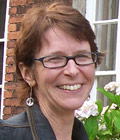 Congratulations to Dr Nicolette Zeeman, who has been appointed a fellow at the Radcliffe Institute for Advanced Study, Harvard University, where she will be working this academic year. She is researching a new project, Caught in the Body, in which she ‘will be looking at medieval theories about image use and the problem of idolatry (image ‘misuse’) and asking how these ideas shape medieval attitudes to the body and its accoutrements, especially in the secular world.’
Congratulations to Dr Nicolette Zeeman, who has been appointed a fellow at the Radcliffe Institute for Advanced Study, Harvard University, where she will be working this academic year. She is researching a new project, Caught in the Body, in which she ‘will be looking at medieval theories about image use and the problem of idolatry (image ‘misuse’) and asking how these ideas shape medieval attitudes to the body and its accoutrements, especially in the secular world.’
Nicky has also been awarded a Leverhulme Fellowship, which she will take up in May 2015 to work on Arts of Disruption. Conflict and Contradiction in Medieval Allegory, looking at some of the narrative structures in Piers Plowman, many of which ‘are characterised by various forms of internal tension and disruption’, and the traditions with which they are in dialogue.
—
Nicolette Zeeman’s Recent Publications
With Dallas Denery and Kantik Ghosh she has recently edited a volume on scepticism in the Middle Ages; published psychoanalytically-oriented pieces on volition and dreams, and an essay entitled ‘Piers Plowman in Theory’ in the Cambridge Companion to Piers Plowman.
Imminent Publications include ‘Mythography and Mythographical Collections’ in the Oxford History of Classical Reception in English Literature 1, edited by Rita Copeland (Oxford University Press); with Elizabeth Leach, ‘Gender: the Art and Hermeneutics of (In)differentiation’ in The Edinburgh Companion to Literature and Music, edited by Delia Da Sousa Correa (Edinburgh University Press); and, edited with Jean Michel Massing, King’s College Chapel 1515 – 2015. Art, Music and Religion in Cambridge (Harvey Miller).
